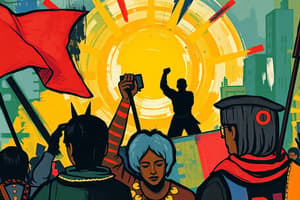Podcast
Questions and Answers
What key factor contributed to the emergence of civil resistance in South Africa during the 1970s?
What key factor contributed to the emergence of civil resistance in South Africa during the 1970s?
- Improved economic conditions for all races
- Increased international tourism
- Growing dissatisfaction among Black South Africans (correct)
- The establishment of the National Party
Which movement was central to fostering psychological liberation among Black South Africans in the early 1970s?
Which movement was central to fostering psychological liberation among Black South Africans in the early 1970s?
- United Democratic Front (UDF)
- African National Congress (ANC)
- Black Consciousness Movement (BCM) (correct)
- Labor Unions
What was the immediate cause of the Soweto Uprising in 1976?
What was the immediate cause of the Soweto Uprising in 1976?
- The rise of international boycotts
- The imposition of Afrikaans as a medium of instruction (correct)
- The banning of labor strikes
- The presence of foreign troops in South Africa
What was a significant outcome of the Soweto Uprising on June 16, 1976?
What was a significant outcome of the Soweto Uprising on June 16, 1976?
Which group played a crucial role in mobilizing youth during the Black Consciousness Movement?
Which group played a crucial role in mobilizing youth during the Black Consciousness Movement?
What was one effect of international pressure on South Africa during the 1970s and 1980s?
What was one effect of international pressure on South Africa during the 1970s and 1980s?
Which organization was NOT directly associated with civil resistance movements during the apartheid era?
Which organization was NOT directly associated with civil resistance movements during the apartheid era?
What was one of the primary influences on the youth's increased resistance during the 1970s?
What was one of the primary influences on the youth's increased resistance during the 1970s?
What was the main purpose of FOSATU when it was formed in 1979?
What was the main purpose of FOSATU when it was formed in 1979?
Which event is recognized as a significant revitalization of trade union and labor activism in South Africa?
Which event is recognized as a significant revitalization of trade union and labor activism in South Africa?
What was a key issue that the United Democratic Front (UDF) opposed?
What was a key issue that the United Democratic Front (UDF) opposed?
How did the ANC respond to the banning of its organization in 1960?
How did the ANC respond to the banning of its organization in 1960?
Which slogan became synonymous with the UDF's campaign against apartheid?
Which slogan became synonymous with the UDF's campaign against apartheid?
Which group received support from various countries, including the Soviet Union and Cuba, during its struggle against apartheid?
Which group received support from various countries, including the Soviet Union and Cuba, during its struggle against apartheid?
What was a consequence of the global anti-apartheid movements during the 1970s and 1980s?
What was a consequence of the global anti-apartheid movements during the 1970s and 1980s?
What strategy did the UDF primarily use in their opposition to apartheid?
What strategy did the UDF primarily use in their opposition to apartheid?
Study Notes
Civil Resistance in South Africa (1970s and 1980s)
- The apartheid regime, implemented in 1948, was characterized by racial segregation and oppression.
- By the 1970s, apartheid was deeply entrenched, leading to heightened resistance from Black South Africans.
Context of Civil Resistance
- Repressive apartheid laws fueled discontent among Black South Africans.
- The influence of the Black Consciousness Movement and the Soweto Uprising of 1976 intensified resistance.
- The emergence of labor unions and worker strikes led to widespread mobilization.
- Increasing international isolation and economic sanctions further weakened the apartheid regime.
Key Forms of Civil Resistance
The Black Consciousness Movement (BCM)
- Led by Steve Biko, the BCM promoted psychological liberation and self-confidence among Black South Africans.
- The movement encouraged Black South Africans to reject apartheid's ideology and reclaim their dignity.
- The South African Students’ Organisation (SASO) played a key role in mobilizing youth against apartheid policies.
- The BCM's influence was evident during the Soweto Uprising in 1976.
The 1976 Soweto Uprising
- Triggered by the imposition of Afrikaans as the medium of instruction in schools.
- On June 16, 1976, thousands of students protested, leading to police brutality and several deaths.
- The uprising spread throughout the country, mobilizing a new generation of activists and international attention to apartheid's brutality.
The Role of Trade Unions and Labor Movements
- The working-class movement became a powerful force in civil resistance.
- Workers organized strikes and boycotts to improve wages, working conditions, and challenge apartheid laws.
- FOSATU (Federation of South African Trade Unions) emerged in 1979 and later merged with other unions to form COSATU (Congress of South African Trade Unions) in 1985.
- A significant event was the 1973 Durban strikes, where over 100,000 workers demanded better wages and conditions.
The United Democratic Front (UDF)
- Established in 1983, the UDF was a non-racial alliance opposing apartheid.
- The UDF opposed the Tricameral Parliament, which failed to provide true representation for Black Africans.
- Popular slogans like "UDF Unites, Apartheid Divides" became rallying cries for the movement.
- The UDF organized protests, boycotts, and strikes throughout the 1980s, often facing violence from the apartheid regime.
- Aligned with the ANC's vision of a non-racial democratic South Africa.
Internal Armed Resistance: The ANC’s Armed Struggle
- The ANC was banned in 1960, but continued underground operations led by Umkhonto we Sizwe (MK).
- MK carried out sabotage actions targeting government installations and security forces.
- While advocating armed resistance, the ANC also supported mass mobilization efforts.
- The ANC, operating from exile, formed alliances with other liberation movements and received support from countries like the Soviet Union, Cuba, and African states.
International Anti-Apartheid Movements and Sanctions
- Global opposition to apartheid intensified during the 1970s and 1980s, putting significant pressure on the South African government.
International Boycotts and Sanctions
- Economic sanctions were imposed by various countries, targeting South Africa's economy and restricting trade.
Studying That Suits You
Use AI to generate personalized quizzes and flashcards to suit your learning preferences.
Description
Explore the key events and movements that shaped civil resistance in South Africa during the 1970s and 1980s. This quiz delves into the apartheid regime's oppressive laws, the influence of the Black Consciousness Movement, and the significant protests that marked this era. Test your knowledge on the fight for freedom and equality in South Africa.




